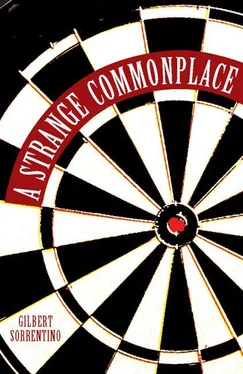HE HELD A PAIR OF DEUCES, A KING OF DIAMONDS, A four of spades, and a seven of clubs. He drew three cards and waited to look to see if he’d got the third deuce. If he had drawn it, what? What would happen? What did he want to happen? Warren and Ray and Blackie were arranging their cards as best they could: Warren, shaking with palsy, Blackie, Jesus, Blackie had almost forgotten how to play the game, thought he was playing rummy half the time, and Ray, half-blind, who’d opened and drawn one card, looked irritated, so it was clear that the two low pair he’d probably been dealt had not miraculously become a full house. Even though he’d probably prayed to St. Anselm or St. Jude or the Blessed Virgin, or maybe the Infant Jesus of Prague. He’d Infant Jesus of Prague him right up his ass if he’d got his third deuce. And if he had, a big black Packard would appear on the lawn where they walked the pitiful Alzheimer’s patients around and around. He’d find his beautiful Borsalino on his shelf next to the idiotic baseball caps his daughter-in-law brought him; he’d make sure to lose them, but she brought more. They all had those logos or dim-witted messages on them. The one he liked best matter-of-factly stated: BORN TO LOVE TRAINED TO KILL. What an impossibly stupid woman she was. Well, he didn’t have to live with her. So, he’d have his Borsalino on, maybe that powder-blue tropical worsted suit he’d babied for years and years with the beautiful drape to the pants. He’d step into his Packard. That sweet young girl he’d got half-drunk with about three lifetimes ago in a bar off Gun Hill Road would be on the seat next to him in a little sun dress, a white sun dress. They’d finish what they started, oh the hell with it. What he really wanted to happen was for Warren and Blackie and Ray to disappear, for the Ridge Meadow Manor to disappear, and for himself to be as if he had never been: not to disappear, but to have never existed. Three deuces would do the trick. He looked at his cards, pushing the tight little booklet open with his thumb, card by card. The card that should have been his third deuce was a four of clubs. Ray, squinting as he laid his cards down, won, of course, with his lousy two pair. Well, all right. Tomorrow he’d try another magical route to oblivion.
HE SITS ON A COUCH IN WHAT SEEMS TO BE A BORROWED or leased apartment, and a woman who, he thinks, is his wife, although she looks like a girl he knew in high school, sits next to him; a boy of six or seven sits next to her, reading Bomba the Jungle Boy. They are, he understands, in Brooklyn. The door opens and a tall and handsome young black man enters. He is wearing a dark suit, starched white shirt, small-patterned navy blue tie, and a navy blue polo coat. He carries a glistening black briefcase. He has what he says is real-estate business to discuss with the woman, and although the two speak in normal, conversational voices, and neither mutter nor whisper, nothing that they say is intelligible. The young black man leaves, smiling faintly, lewdly, and he watches him through the street-floor window, next to which is a floor-model Philco radio. The young black man pauses on the steps leading to the sidewalk, then, pulling on a pair of gray suede gloves, descends quickly and is lost to sight. He and his wife and the child rise from the couch and stand on the sidewalk. They are going to dinner, a decision made wordlessly. They are going to Manhattan to have dinner, and find themselves amid a large crowd of people heading for the subway station. He reaches into his pocket to count his change, and notices that his wife has removed her suit jacket and walks next to him in a white brassiere. He says, “You’re a real sport to do that.” The child has disappeared, a good thing, or so he thinks, but he is relieved to see that she is carrying his book, which, he now sees, is Pierre. He would like to touch her breasts, but many women in the crowd angrily warn him not to. He has ninety-nine cents, surely more than enough for the subway. He nods at his wife, who is being ogled by passing black men, and they head toward a change booth, curiously situated on the street, and, even more curiously, one that has a green-and-black Art Deco facade, as do, he well knows, most bakeries. As they approach, the change booth, he sees, is a store with an open front, much like a greengrocery. Inside the store are three Jewish men, one of whom is sitting in the shadows in the rear of the room. He has a black blanket over his legs, which appear to end at his knees. “The Holocaust,” he says, and laughs. Another man stands to the side of the room, leaning arrogantly against the wall, and the third greets him with a nod, and pulls a black watch cap over his red kinky hair. The men are disheveled, dirty, and unkempt, and the store smells of fish. He holds out his hand, the change on his palm, and asks for two tokens. He tells the man, in what he knows is a badly disguised hysteria, that he and his wife want to dine in Manhattan. The man smiles, as does the other man, still leaning against the wall. “Wife?” the man says, and he sees that his wife has returned to the apartment, although he holds her jacket in his hand. The man takes the change and puts it in his watch cap. “Your name is Charles, is that correct?” He writes on a pad and shows it to him, but the name that he has written is “Claire.” “No, I want to eat.” “Eat?” the man says. “Fifty-six twenty-five Parkcrest West is your apartment?” The man nods, and thinks that he will never be able to find his way back to the apartment, to which he is now certain that his wife has not returned, but, instead, is having sex with two men in a hallway. The redheaded man reaches into his pocket and gives him two ten-dollar bills and three singles. “Here! Interest on the five hundred dollars your uncle told you about.” He cannot remember what uncle the man is referring to. “What?” he says. “I don’t want to get involved. Where is my wife?” But the men have left the store and where the wall against which the man slouched had been there now stands a high wooden fence, on the other side of which he can hear the three men laughing and commenting on his wife’s breasts in exaggerated Yiddish accents. He shouts, hoping that he can be heard on the other side of the fence, and the voices suddenly stop. He sees that the fence has, some four feet above the ground, a glassless window, behind which there is a kind of corral. The redheaded man is in the center of this corral, speaking to a woman dressed in a white shirt, fashionably faded and tattered jeans, and highly polished boots. The redheaded man has an expression of stupid and besotted lust on his face, a look of idiotic fascination. “I so admire Meryl Streep,” he says, “she is such a great thespianess.” The woman looks like Meryl Streep, but is a whore. He knows, now, that the redheaded man will not tell him anything about the subway that took his wife to the hallway, that he has completely forgotten him, that he is hypnotized by this whore. She smiles lasciviously at the redheaded man and suddenly, almost comically, falls on her back onto the muddy ground where she lies, supine, at his feet. Her arms are rigid at her sides and, naked below the waist save for her boots, she has spread her legs. The redheaded man is going to mount her. “Twenty-three dollars,” she says. His wife strolls into the corral and says, “What a cheap lay.” The young black man, who has been sitting on a folding chair, opens his briefcase. “I got the money,” he says, “I got the money, you fucking Jew bastard.”
HE WAS A SENIOR CREDIT INVESTIGATOR NOW FOR Textile Banking, a man to whom the younger men came for advice. He had his own cubicle and a pool secretary. Even though he himself was comparatively young, he was, he felt, entitled to wear an oxford gray suit and a homburg. She’d laughed at him when he first bought the hat, and her deadbeat summer friends from the beaches and bars of Coney Island and the Rockaways laughed, too, though they didn’t know him, didn’t even know his name. All they knew was that this boring office slave had managed to land Estelle. She was some piece of ass. They figured he’d been married before, because Estelle occasionally talked about some whining bitch and her brat who wanted more money, more money, always more money. And he’d just, finally, gotten a raise, for God’s sake. He emerged from the rooftop cupola and there they were, five tanned young jerks, sitting under an awning they’d rigged out of blankets and sheets they’d tied to and draped over clotheslines and poles. Estelle looked up and moved away, slightly, from some redheaded slob with his arm around her shoulders, but only slightly. She called out to him to come on over and have a cold beer in the shade. “You won’t even need a hat!” she yelled, the cunt. She laughed delightedly, and the slobs laughed even more delightedly. They were drinking his beer, they were eating his food, they were spending his money, they were, maybe, of course they were, fucking his wife. His wife. Jesus Christ Almighty, what a horse’s ass he’d turned out to be. He stood in the brutal sun, sweating in his oxford gray suit and gray homburg and black wing-tip shoes; in his black silk socks and black garters and white shirt; in his dark-blue tie and gold tie clasp. He smiled cheerfully and waved at the wonderful gang of carefree youths. He couldn’t wait to join the fun! Off came his homburg as he started toward them. It would be a cinch to throw her off the roof, but not today. Not today.
Читать дальше











